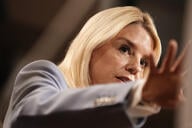You have /5 articles left.
Sign up for a free account or log in.
I began my academic career at the height of the McCarthy era and have vivid recollections of the intensity with which the nation was consumed by fears of communism, with special attention to the “loyalty” of government employees and faculty members of colleges and universities. Non-communist oaths were enacted in most states and demanded of those who taught at public colleges. For my doctoral dissertation, I chose the topic of loyalty oaths and was then, and remain, intrigued by the obsession of many Americans in times of real or imagined national stress with loyalty and patriotism. The Vietnam War and the post-9/11 anti-terrorism fervor have and continue to unleash challenges to the meaning of patriotism in a constitutional democracy. Now the 2008 election campaign has revealed the ease with which differences of opinion become tests of loyalty.
Sen. John McCain, Republican candidate for president, has as his slogan “country first” and refers to rivals as the “me first, country second” crowd. Sen. Barack Obama, the Democratic candidate, found himself besieged by questions about his patriotism, apparently growing out of his unusual heritage, past associations and failure to wear a “flag pin.” He found it necessary to give a long speech about patriotism called “The America We Love.” He asserted, as many have over the course of the nation’s history, that people can disagree without challenging each other’s patriotism.
The allegations against Obama intensified as he drew ahead of McCain in the polls. The Republican vice presidential candidate, Gov. Sarah Palin, made patriotism and doubts about Obama’s beliefs a mantra of her campaign events. She made references to “pro-America” parts of the country, an idea “improved” upon by Republican congresswomen Michele Bachmann of Minnesota who suggested that the press investigate members of Congress to determine who among them were “pro-America or anti-America."
The unrelenting attack by the McCain campaign on Obama's occasional contacts with William Ayers, the University of Illinois at Chicago education professor and notorious Vietnam era radical founder of the Weather Underground, is a classic example of guilt by association, a common tactic of the McCarthy period.
Patriotism is generally defined as love for one’s country. It is an easy step to identify one’s self-interest with the national interest and make it a test of patriotism. Nothing puts a person more on the defensive than a challenge to his or her loyalty to the nation. Claims of patriotism are often referred to, in the words of Samuel Johnson, as “the last refuge of a scoundrel,” though others see it as the first and last refuge of scoundrels. George Washington, in his Farewell Address, cautioned against the “impostures of pretended patriotism.”
Loyalty and patriotism take a unique American form because we do not pledge fealty to a sovereign in the form of a king or queen, or to a dictator holding autocratic power. Nor do we espouse fidelity to a tribe or to a nation based on alleged blood relationships, racial purity, or religious zealotry. The American form is far more complicated, based on commitment to a set of ideas best summed up in the Declaration of Independence and the Constitution of the United States which evoke a sense of an undefined and perhaps indefinable American creed of freedom, equality, justice and opportunity.
It is instructive that the Founding Fathers, familiar with the abuse of patriotic themes in England and revolutionary America, prescribed in the Constitution the oath to be taken by the president upon taking office: “I do solemnly swear (or affirm) that I will faithfully execute the office of president of the United States, and will to the best of my ability, preserve, protect and defend, the Constitution of the United States.” The Constitution then requires all national and state legislative, executive and judicial officers to “be bound by oath or affirmation to the support this Constitution” with the admonition that “no religious test” is to be required for any public office. The Founders also took special note of abusive use of accusations of the supreme act of disloyalty -- treason -- and provided in the Constitution for a specific definition of the crime, the proof required for conviction, and prohibiting tainting of family.
An oath to support the Constitution says nothing more than what is the obligation of anyone residing in the United States to support the basic law of the land. Allegiance is to the law and the Constitution is the supreme law. The obligations of allegiance are not created by the taking of an oath. It does not commit a person to specific action or belief, nor does it require an express disavowal of any particular action or belief. Indeed, an oath to support the Constitution does not even convey a particular political or economic theory and certainly does not mean allegiance to a political party. A socialist and a libertarian can honestly take the same oath, and do. There can be no treason in matters of opinion because there is no sovereign command over opinion, including whatever “pro-America” means. The Declaration of Independence repudiates the notion of perpetual allegiance with its message of equality and the freedom to alter or abolish the government.
When you swear to uphold the Constitution of the United States, what have you pledged to do or sworn to uphold? If the U. S. Supreme Court can repeatedly divide 5-4 over the meaning of ordinary terms such as free speech or right to counsel, the problem of definition is manifest. When the Supreme Court completely distorted a constitutional phrase, “equal protection of the laws” as it did in the notorious case of Plessy v. Ferguson (1896) to mean “separate but equal,” it sealed the fate of a racially segregated society for generations. In fact, during the civil rights revolution of the 1950s and 1960 proponents of racial equality were regularly challenged as communists, disloyal, and enemies of the Constitution and the “American way of life.”
Oaths of office or citizenship commonly call for a person to swear to support and defend the Constitution against all enemies foreign and domestic though it is not always clear who the enemies are from day to day. Just in my lifetime the “enemies” have included, Japan, Germany, Italy, North Korea, North Vietnam, China, the Soviet Union, communists in general and terrorist in general. I am not always sure who the enemy is in Iraq and I suspect that Iran may be on the list. I admit that I never have been clear about who the enemies are in the continuing tribal warfare in Eastern Europe or Africa or Asia where our country take sides now and then including use of military force. The United Nations had 51 member nations when established in 1945 and now has 192 and few people know where many of them are located or which are enemies, domestic or foreign.
In times of national or international stress, perceptions of loyalty and patriotism change. Unlike a pledge of allegiance or generalized oath to support the Constitution, a special loyalty oath is a political test, as is any claim that one can distinguish among the pro-America and anti-America people. Such patriotic posturing establishes specific but often shifting standards of conduct or belief, requires abjurations of past or even future behavior and, if possible, imposes disabilities for refusal to subscribe. Were these mere word games, it would afford a superb outlet for debate. Unfortunately, too often they are used to promote war among nations, internecine warfare among neighbors, destruction of careers and withholding of privileges and rights. Witness McCarthyism in the 1950s and the Vietnam protests of the 1960s.
Conflicts over patriotism along with the imposition of test oaths are not a novelty in American history. They began in the colonial period, transferred from long standing British practices with religious test oaths, and were imposed before, during and after the Revolutionary War. The Civil War and Reconstruction brought forth such a rash of test oath demands by both sides that in the Border States the joke was that people could not recall which oath they took last. One of the first reactions by American political leaders to the Russian Revolution of 1917 was the imposition of test oaths for teachers which lingered until and well beyond WWII as anti-communist fervor swept the nation and remain an often ignored but staple requirement in most states today. Post WWII non-communist oaths were imposed upon a wide range of persons including lawyers, labor union officials, political parties, and even residents of public housing and student loan recipients. Allegations of disloyalty, even indirectly by requiring test oaths are weapons to impose fear and control beliefs. The impact upon society at large goes beyond oath takers to observable widespread chilling effects upon exercise of First Amendment rights to speech and association.
Most of the lawsuits and literature about test oaths and deprivations of rights such as loss of a job involve persons fully qualified to sign but refusing to do so on constitutional principle. I have yet to find a defense of test oaths that goes beyond patriotic harangue, e.g., “any loyal American would be happy to take it” or the fantasy that it will expose traitors and protect national security. A loyalty test is no more likely to stop a traitor than all the criminal laws on the books deter crime
Coincidentally, during the past year, two faculty members on separate California State University campuses refused to subscribe to an oath prescribed for faculty by the Constitution of California in 1952, a legacy of the McCarthy era, to “support and defend” the national and state constitutions. Both faculty members are Quakers who wanted to make clear that their defense would be non-violent in character.We have a long tradition of honoring conscientious objection to war. While the cases were resolved by permitting the addition of a caveat on their oath forms, the very existence of such a requirement for faculty surprised many people who thought of loyalty oaths as relics of history.
Members of the academic community need to be especially sensitive to the misuse of allegedly patriotic fervor. Professors have always been the target of oath laws and patriotic suspicion, presumably because of their influence upon the young. But the assumption cannot be escaped that oaths and other patriotic demands directed at teachers suggest that they are more likely to betray their country than others, which is not only patently absurd, but a threat nevertheless to the core beliefs of academic freedom. This absurdity was humorously captured by an anonymous bard, a faculty member in California in the early 1950s when the university was besieged by investigations and loyalty oath demands:
Ode to Hysteria: University Division
I am the very model of a member of the faculty
Because I’m simply overcome with sentiments of loyalty
I daily think of reasons why I’m glad to be American
And thank the Lord I’ve always been a registered Republican
The thoughts I think are only thoughts approved by my community
I pledge allegiance to the flag at every opportunity
I haven’t had a thing to do with Communist conspirators
And neither have my relatives, descendants, or progenitors.
The rise of the patriotism issue in our presidential election of 2008 amidst contemporary worldwide conflicts, threats to peace and actual warfare in which our country is engaged makes it imperative to guard against partisan claims to allegiance and patriotism. An agreement to disagree, so basic to American life, though alien to much of the world, is, in the absence of unlawful acts of betrayal, the core of American liberty.




